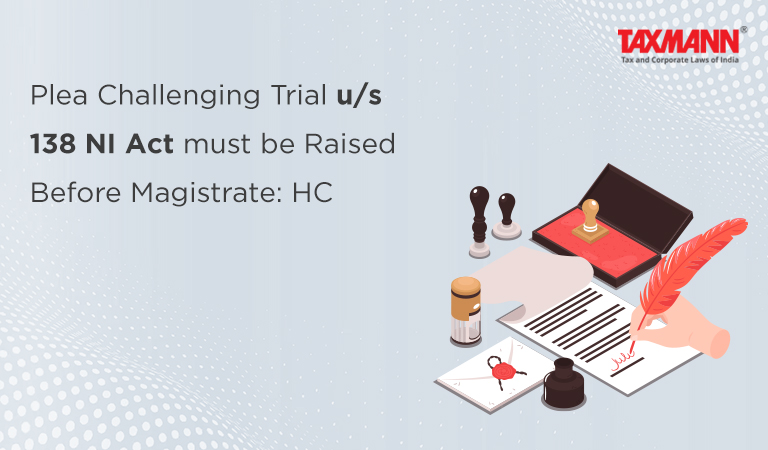Plea Challenging Trial u/s 138 NI Act must be Raised Before Magistrate: HC
- News|Blog|FEMA & Banking|
- 3 Min Read
- By Taxmann
- |
- Last Updated on 1 May, 2023

Case Details: Dinesh Verma v. State Govt. of NCT - [2023] 149 taxmann.com 303 (HC-Delhi)
Judiciary and Counsel Details
-
- Rajnish Bhatnagar, J.
- Idresh Ahmed, Adv. for the Petitioner.
- Ms Priyanka Dalal, APP, Rana Ranjit Singh, Ravish Singh, Ms Akanksha Singh, Vivek Kumar Singh & Ashish Mohan, Advs. for the Respondent.
Facts of the Case
In the instant case, the complainant (i.e. the respondent) instituted a complaint case u/s 138 of the Negotiable Instruments Act, 1881 against the petitioner in respect of non-payment against three dishonoured cheques issued by the petitioner in favour of the respondent.
The Metropolitan Magistrate issued summons u/s 138 of the Negotiable Instruments Act, 1881 requiring the petitioner to attend the Court. Being aggrieved, the petitioner filed the petitions invoking the jurisdiction of the High Court u/s 482 Cr.P.C. to quash the summoning order.
The petitioner contended that the complaint filed by the respondent u/s 138 of the Negotiable Instruments Act, was false and frivolous and was made after making forged signatures on the cheques in question. The petitioner, further submitted that the cheques in question were misused by the respondent after stealing them from the petitioner in 2009-2010.
The petitioner also submitted that the petition was filed bona fide, in the interest of justice and without any intentional delay. In response, the respondent submitted that the cheques in question were presented within their validity period. They got the intimation of cheques being dishonoured on 13-12-2018 and subsequently, the legal notice was issued on 27-12-2018.
The respondent, further submitted that more than 15 days elapsed from the date of receipt of the notice. However, the petitioner still failed to make any payment. They also submitted that the petitioner, knowing well that his cheques would not be honoured by the drawee bank and that there was not sufficient balance in the bank account, issued the cheques in question.
The respondent also submitted that the petitioner had failed to give any satisfactory explanation for the inordinate delay in filing the present petitions, and therefore, no case for quashing the summoning orders was made out.
High Court Held
The High Court observed that the Negotiable Instruments Act provides sufficient opportunity to a person who issues a cheque. The High Court, further observed that once a cheque is issued by a person, it must be honoured and if it is not honoured, the person is given an opportunity to pay the cheque amount by the issuance of notice and if he still does not pay, he is bound to face criminal trial and consequences.
The High Court held that since it was apparent from the summoning orders that the Magistrate had perused complaints as well as an affidavit in evidence filed in support of complaints and other documents filed on record, it could not be said that the Trial Court committed any error while summoning the petitioner.
In view of the above, the High Court cannot usurp the powers of the Metropolitan Magistrate and entertain a plea of the accused, as to why he should not be tried under section 138. Therefore, the instant petition was to be dismissed.
List of Cases Reviewed
-
- Pepsi Foods Ltd. v. Special Judicial Magistrate [1998] 5 SCC 749 (para 5)
- S.M.S. Pharmaceuticals Ltd. v. Neeta Bhalla [2005] 148 Taxman 128/63 SCL 93 (SC) (para 5)
- Omniplast (P.) Ltd. v. Standard Chartered Bank [2015] 15 SCC 693 (para 5) distinguished.
List of Cases Referred to
-
- Pepsi Foods Ltd. v. Special Judicial Magistrate [1998] 5 SCC 749 (para 5)
- S.M.S. Pharmaceuticals Ltd. v. Neeta Bhalla [2005] 148 Taxman 128/63 SCL 93 (SC) (para 5)
- Omniplast (P.) Ltd. v. Standard Chartered Bank [2015] 15 SCC 693 (para 5)
- Shivom Minerals Ltd. v. State [Crl. M.C No. 4984 of 2018, dated 17-7-2019] (para 5).
Disclaimer: The content/information published on the website is only for general information of the user and shall not be construed as legal advice. While the Taxmann has exercised reasonable efforts to ensure the veracity of information/content published, Taxmann shall be under no liability in any manner whatsoever for incorrect information, if any.

Taxmann Publications has a dedicated in-house Research & Editorial Team. This team consists of a team of Chartered Accountants, Company Secretaries, and Lawyers. This team works under the guidance and supervision of editor-in-chief Mr Rakesh Bhargava.
The Research and Editorial Team is responsible for developing reliable and accurate content for the readers. The team follows the six-sigma approach to achieve the benchmark of zero error in its publications and research platforms. The team ensures that the following publication guidelines are thoroughly followed while developing the content:
- The statutory material is obtained only from the authorized and reliable sources
- All the latest developments in the judicial and legislative fields are covered
- Prepare the analytical write-ups on current, controversial, and important issues to help the readers to understand the concept and its implications
- Every content published by Taxmann is complete, accurate and lucid
- All evidence-based statements are supported with proper reference to Section, Circular No., Notification No. or citations
- The golden rules of grammar, style and consistency are thoroughly followed
- Font and size that’s easy to read and remain consistent across all imprint and digital publications are applied



 CA | CS | CMA
CA | CS | CMA
